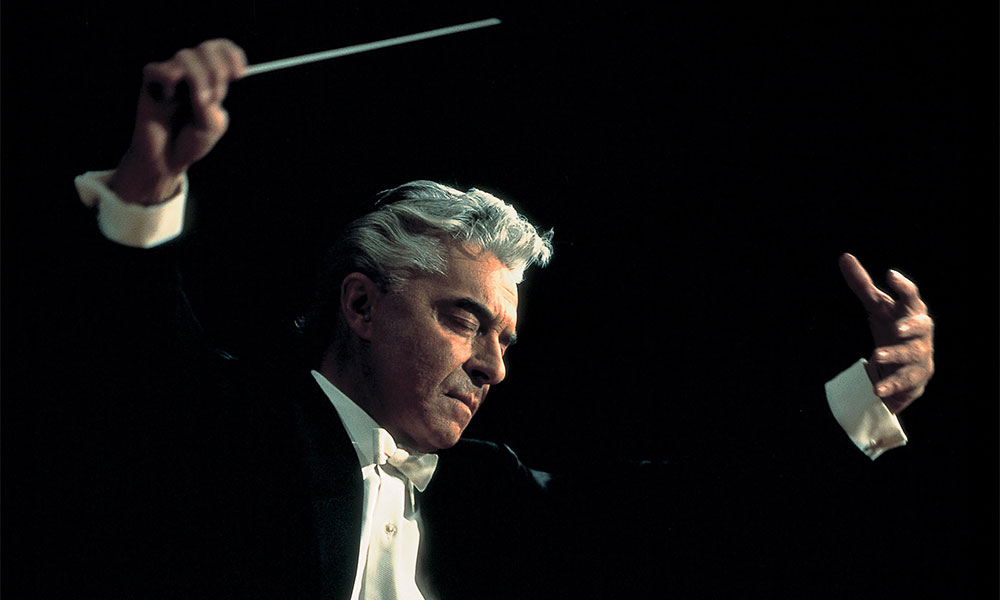Herbert von Karajan is regarded as one of the greatest conductors of all time. He was the principal conductor of the Berlin Philharmonic for 35 years, and under Karajan, the orchestra developed its very own performance culture characterized by beauty of sound, virtuosity, and perfection. Karajan turned the Berlin Philharmonic into perhaps the most impressive-sounding orchestra ever. He aimed to merge the best qualities of his idols, Wilhelm Furtwängler and Arturo Toscanini, particularly their precision and elasticity, into his own style. Karajan once simultaneously held six of the world’s most prestigious musical posts, including artistic director of the Vienna State Opera and conductor for life of the Berlin Philharmonic. He is the biggest-selling classical artist in recorded music history and has sold over 200 million records. Karajan’s legendary discography contains some of the most valued interpretations of the repertoire available.
To celebrate the legacy of Herbert von Karajan, listen to the Best of Karajan on Apple Music and Spotify.
Beethoven: Symphony No. 9 (4776325)
Herbert von Karajan, Berliner Philharmoniker, Anna Tomowa-Sintow, Agnes Baltsa, Peter Schreier, José van Dam, Wiener Singverein
Many consider Karajan’s 1976 rendition of Beethoven’s Symphony No 9 (Choral) his best recording of the symphony. The recording is fastidiously engineered and listeners who like Karajan’s driven yet hyper-meticulous style and ruthless attention to detail will find all they want in this recording.
“In the finale, the concluding eruption has an animal excitement rarely heard from this highly controlled conductor …” – The Penguin Stereo Record Guide.
Richard Strauss: Also Sprach Zarathustra (4795084)
Herbert von Karajan and Berliner Philharmoniker
“Like many Austrian and German musicians of his time, Karajan was deeply influenced by Strauss. He was fascinated by his genius as a conductor (so calm, so logical, so rhythmically astute) and inspired by Strauss’s music … No one has played Also Sprach Zarathustra with more lustrous sound – with more range and weight of tone – than Karajan and the Berlin Philharmonic,” remarks Richard Osborne in his liner notes.
Puccini: La Bohème (4210492)
Herbert von Karajan, Berliner Philharmoniker, Freni, Pavarotti
Karajan is a great Puccini conductor who can linger over the beauties of the orchestration adding to the intensity of the drama. Orchestration details that are frequently lost are clearly audible here, often to revelatory effect. Pavarotti is at his finest in this recording of La Bohème and Gramophone magazine said, “Pavarotti’s Rodolfo is perhaps the best thing he ever did.” The recording is exceptional and the sound is exemplary.
Wagner: Der Ring Des Nibelungen
Herbert von Karajan and Berliner Philharmoniker
For his monumental Ring cycle Karajan assembled a world-class cast of singers who were able to convey his vision – lyrical and with a clear and vivid declamation of the text. Karajan’s Ring cycle is quite distinct from others: a more otherworldly approach concerned with beauty, lyricism and structure.
“The artistic result is extraordinary (with a wonderful BPO and Karajan on the very top level) – but what strikes me even more is the wonderful sound quality of these recordings,” – Gramophone magazine.
Mendelssohn: Symphonies Nos. 3 & 4 (4497432)
Herbert von Karajan and Berliner Philharmoniker
“Karajan brings Mendelssohn’s inspired sound picture dramatically to life with superb orchestral playing, sympathetic characterization, and a sophisticated control of the perfect structure, “ observes Ivan March in his liner notes.
“… splendid performances, performances in which the greatness of this music is never in doubt …” – Gramophone magazine.
Mozart: Requiem (4390232)
Herbert von Karajan, Wiener Philharmoniker, Anna Tomowa-Sintow & Helga Müller-Molinari & Vinson Cole & Paata Burchuladze & Wiener Singverein
Karajan’s early recordings of Mozart’s Requiem were made with the Berlin Philhamoniker but this 1986 recording was made with the Wiener Philharmoniker. Their interpretation almost rivals performances of Verdi‘s Requiem for operatic flair and their romantic and magisterial view of Mozart’s Requiem is an emotional experience from beginning to end. Some may regard this interpretation as excessively operatic in style while others will find it very moving.
Prokofiev: Symphony No. 5 (4636132)
Herbert von Karajan and Berliner Philharmoniker
“Karajan’s is undoubtedly the finest currently available version of the Fifth. It is admirably unaffected, beautifully played, with the Berlin Philharmoniker at the height of its form, and the DGG engineers at their best. The recording is a model, allowing all the subtleties of the orchestral colouring to register without any distortion of perspective. It has splendid range and fidelity …” – The Penguin Stereo Record Guide
Shostakovich: Symphony No. 10 (4775909)
Herbert von Karajan and Berliner Philharmoniker
“The composer whose music best summed up for Herbert von Karajan the human dimension of the tragic century into which he was born was Dmitri Shostakovich, the man he would like to have been, Karajan once said, if he had been a composer. Among the works Karajan particularly admired were the Eighth Symphony and the Tenth, of which he was one of the great interpreters,” observes Richard Osborne in his liner notes.
“Karajan pursues the climaxes more relentlessly than his rivals, screws more intensity out of the jagged outlines; for those reasons his account has the greatest impact.” – Financial Times
Mendelssohn/Bruch: Violin Concertos (4636412)
Herbert von Karajan, Berliner Philharmonic, Anne-Sophie Mutter
“Through patient rehearsals and a considerable capacity for understanding, Karajan was instrumental in coaxing from Anne-Sophie Mutter a performance that was not only technically perfect in a way that was demanded by the age of the gramophone but that also sounded entirely natural. It was to Karajan that she owed her early international reputation …” remarks Franzpeter Messmer in his liner notes.
Mahler: Symphony No. 5 (4794668)
Herbert von Karajan and Berliner Philharmoniker
“… in the unprecedented virtuosity of their realization of the Fifth Symphony- its refinement and intoxication, as well as its terrors and agonizing portents of a new age – the aesthete Karajan and his orchestra have made a striking contribution to the history of Mahler interpretation. For Karajan it was a protracted quest, for the listener it is a belated discovery,” observes Peter Fuhrmann in his liner notes.




